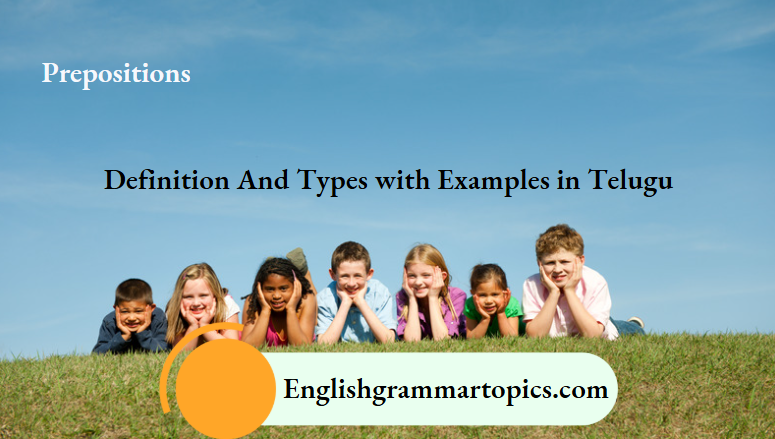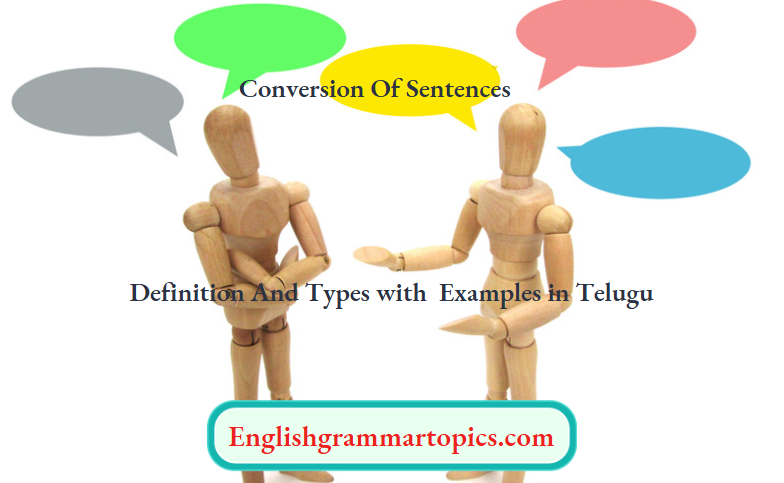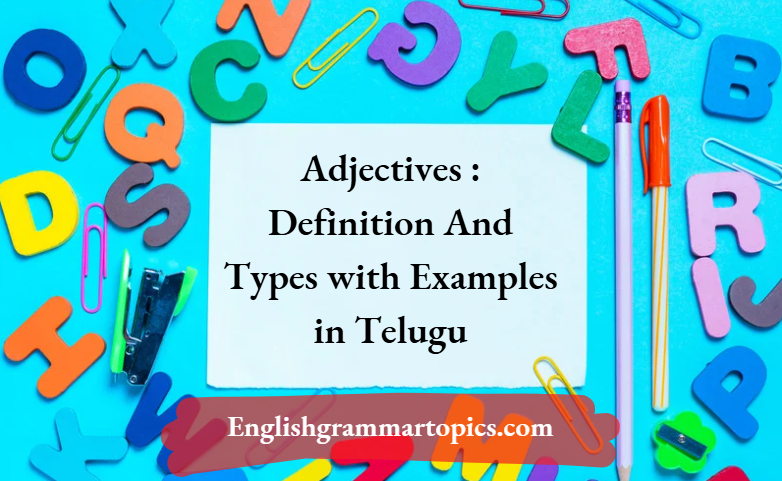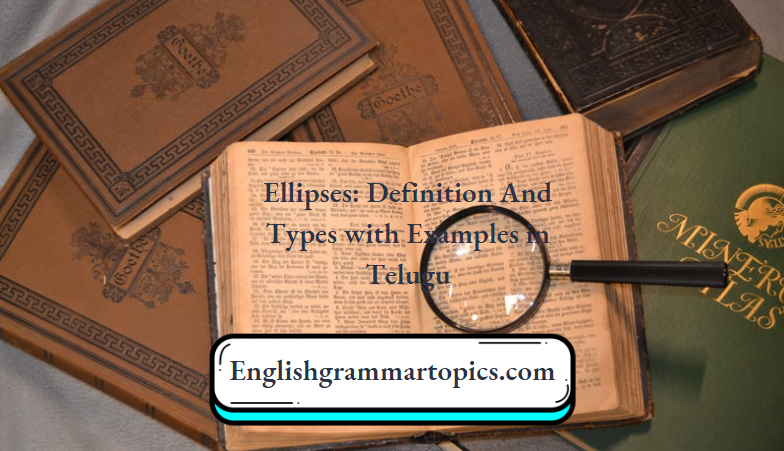Tenses Introduction
210. ఈ క్రింది వాక్యములను చదవండి:
1. I write this letter to please you.
2. I wrote the letter in his very presence.
3. I shall write another letter tomorrow.
మొదటి వాక్యములోని Verb “write” – present time. (cht)
రెండవ వాక్యములోని Verb “wrote” – past time,
మూడవ వాక్యములోని Verb “shall write” – future time.
Read and Learn more English Grammar Topics
211. ఈ విధముగా Verb తన యొక్క present, past tense మరియు future tense లను తెలియజేస్తుంది. 211. వర్తమానకాలమును అనగా ఇప్పటి కాలమును తెలియజేయు Verb ను Present Tense లో ఉన్నది అంటాము.
I write. I love.
భూతకాలమును అనగా గడచిపోయిన కాలమును తెలియజేయు Verb ను Past Tense లో ఉన్నది. అని అంటాము.
I wrote. I loved.
భవిష్యత్ కాలములోని రాబోవు పరిస్థితిని తెలుపు Verb ను అది Future Tense లో నున్నది అని
అంటాము.
I shall write. I shall love.
212. ఈ విధముగా మూడు ప్రధానమైన Tenses (కాలమానములు) ఉన్నవి. అవి : భూత, భవిష్యత్, Sgar renew. m The Present, the Past, the Future.
గమనిక (Note) : కొన్ని సార్లు సందర్భమును బట్టి past tense వర్తమానకాలం అర్థాన్ని (sense of present tense) Present tense, future tense 55.
I wish I knew the answer. (= I’m sorry I don’t know the answer).
(Past tense – Present time)
Let’s wait till he comes, (Present tense- future tense)

213. ఈ క్రింద “love” అను పదమునకు సంభవించే ముఖ్యమైన Tenses చూపబడినవి :
| PRESENT TENSE | ||
| Singular Number | Plural Number | |
| 1st Person | I love | We love |
| 2nd person | You love | You love |
| 3rd Person | He loves | They love |
| PAST TENSE | ||
| Singular Number | Plural Number | |
| 1st Person | I loved | We loved |
| 2nd Person | You loved | You loved |
| 3rd Person | He loved | They loved |
| FUTURE TENSE | ||
| Singular Number | Plural Number | |
| 1st Person | I shall/will love. | We shall/will love |
| 2nd Person | You will love | You will love |
| 3rd Person | He will love | They will love |
214. ఈ క్రింది వాక్యములను చదవండి.
1. I love. (Simple Present)
2. I am loving. (Present Continuous)
3. I have loved. (Present Perfect)
4. I have been loving. (Present Perfect Continuous)
ఈ పై వాక్యములలో Verbs (క్రియలు) అన్నీ కూడా present tense (వర్తమాన కాలములో నున్నవి. మొదటి వాక్యములోని Verb యొక్క action మామూలు ధోరణిలో సామాన్యముగా చెప్పబడినది. ఆ పని పూర్తి అయ్యిందా లేక అసంపూర్తిగా మిగిలి పొయ్యిందా అనే విషయం జోలికి పోలేదు.
రెండవ వాక్యములో, action ఇంకా నడుస్తూనే ఉంది. కాని ఆగిపోలేదు. పూర్తికాలేదు అని అర్ధం. మూడవ వాక్యములో action మాట్లాడు సమయానికి సంపూర్ణముగా అంకితం అయ్యింది అని చెప్పబడినది.
నాలుగవ వాక్యములో action ఇంకా పూర్తిగా నడుస్తూ ఉంది. పూర్తి కాలేదు అనే అర్ధం వస్తుంది. దీనిని present perfect continuous tense అని అంటాము. ఇచ్చట action సమగ్రంగా సడుస్తూంది అనే భావానికి బలం వస్తుంది. ఈ విధముగా tense ఎప్పుడు action సంభవించింది అనే విషయమే కాకుండా, ఆ పని ఏ విధంగా జరుగుతుంది అనే అర్థాన్ని కూడా యిస్తుంది.
215. Present Tense verb కు నాలుగు రూపములు ఉన్నట్లుగా Past Tense కు కూడా నాలుగు రూపాలు (భాగములు) ఈ క్రింద చూపబడిన విధముగా ఉన్నవి :
1. I loved. (Simple Past)
2. I was loving. (Past Continuous)
3. I had loved. (Past Perfect)
4. I had been loving. (Past Perfect Continuous)
అదే విధముగా Future Tense కు కూడా నాలుగు భాగములు ఉన్నవి :
1. Ishall/will love. (Simple Future)
2. I shall/will be loving (Future Continuous)
3. I shall / will have loved. (Future Perfect)
4. I shall have been loving. (Future Perfect Continuous)
ఈ విధముగా Verb లోని భాగమైన Tense అనునది time, action యొక్క పరిస్థితిని (ఎంత వరకు పూర్తి అయ్యింది అనే భావము) సూచించునని తెలుస్తుంది.
216. Verb ఎప్పుడు కూడా, Subject (కర్త) యొక్క number (singular, plural) ను మరియు subject యొక్క person (నేను, నీవు, అతడు) అను భావములను అనుసరించి యుండును.
| Simple Present Tense | Present Continuous Tense |
| I speak | I am speaking |
| You speak | You are speaking |
| He speaks | He is speaking |
| We speak | We are speaking |
| They speak | They are speaking |
| Present Perfect Tense | Present Perfect Continuous Tense |
| I have spoken | I have been speaking |
| You have spoken | You have been speaking |
| He has spoken | He has been speaking |
| We have spoken | We have been speaking |
| They have spoken | They have been speaking |
| Simple Past Tense | Past Perfect Tense |
| I spoke | I had spoken |
| You spoke | You had spoken |
| He spoke | He had spoken |
| We spoke | We had spoken |
| They spoke | They had spoken |
| Past Continuous Tense | Past Perfect Continuous Tense |
| I was speaking | I had been speaking |
| You were speaking | You had been speaking |
| He was speaking | He had been speaking |
| We were speaking | We had been speaking |
| They were speaking | They had been speaking |
| Simple Future Tense | Future Perfect Tense |
| I shall/will speak | I shall/will be speaking |
| You will speak | You will be speaking |
| He will speak | He will be speaking |
| We shall/will speak | We shall/will be speaking |
| They will speak | They will be speaking |
| Future Continuous Tense | Future Perfect Continuous Tense |
| I shall/will have spoken | I shall/will have been speaking |
| You will have spoken | You will have been speaking |
| He will have spoken | He will have been speaking |
| We shall/will have spoken | They will have spoken |
| He shall/will have been speaking | They will have been speaking |
అభ్యాసము 45
(a) ఈ క్రింద ఇవ్వబడిన వాక్యములలోని Verbs ను గుర్తించి దాని Moods, Tenses ను తెలుపుము.
1. The river flows under the bridge.
2. I shall answer the letter to-night.
3. I knew he was there, for I had seen him come.
4. It has been raining all night.
5. I hear he has passed all right.
6. I had finished when he came.
7. He takes but little pride in his work.
8. I have been living here for months.
9. Be good, sweet maid.
10. By this time to-morrow I shall have reached my home.
11. It is time we left.
12. He told me that he had finished the work.
13. God forgive you !
14. He is waiting for you in the compound.
15. Piper, pipe that song again.
16. I am hoping to gel a holiday soon.
17. Perhaps it were better to obey him.
18. Do noble deeds, not dream them all the day.
19. I shall have plenty of time tomorrow.
20. Though this be madness, yet there is method in it.
21. The king had never before led his troops in battle.
22. If he was guilty, his punishment was too light.
23. We have heard a strange story.
24. The travellers, all of whom had seen the chameleon, could not agree about its colour.
25. Beware lest something worse should happen, to you.
26. The farmer is cutting the corn which hasripened.
27. I wish my brother were here.
28. She would rather we stayed till tomorrow.
అధ్యాయము 25
The Uses Of The Present And Past Tenses Present Tenses
Simple Present Tense
217. Simple Present ను ఈ విధంగా ఉపయోగిస్తారు :-
(1) ఒక అలవాటును (habit) చిత్రీకరించుటకు :
He drinks tea every morning.
I get up everyday at five o’clock.
My watch keeps good time.
(2) ఒక సత్యాన్ని తెలియజేయుటకు
The sun rises in the east.
Honey is sweet.
Fortune favours the brave.
(3) Here, there అను పదములతో ప్రారంభింపబడి, ఏమి జరుగుచున్నది అనే భావాన్ని తెలియజేయుటకు
Here comes the bus!
There she goes!
(4) ప్రత్యక్ష కథలో Simple Past Verb కు అనుబంధముగా –
Sohrab now rushes forward and deals a heavy blow to Rustam.
Immediately the Sultan hurries to his capital.
(5) ఒక ఖచ్చితమైన programme కు లేక ఒక fixed timetable కు భాగంగా నున్న భవిష్యత్ సంఘటనను తెలియచేయుటకు
The next flight is at 7.00 tomorrow morning.
The match starts at 9 o’clock.
The train leaves at 5.20.
When does the coffee house reopen?
వాడుక భాషలొ ఈ భావాలు బాగా కనిపిస్తాయి.
218. Simple Present Tense verb ను వేరే విధములుగా వాడే విధానములను గూడా ఇచ్చట పరిశీలించండి:
(1) కొటేషన్లు చూపడానికి ఉపయోగిస్తారు.
Keats says, ‘A thing of beauty is a joy for ever’.
(2) ఒక condition ను గాని, ఒక time ని గాని తెలియజేయు clauses లో Simple Future Tense కు బదులుగా దీనిని వాడతారు.
I shall wait till you finish your lunch.
If it rains we shall get wet.
(3) Sports ను cover చేసే broadcasting commentaries లో ఒక దాని తరువాత ఇంకొకటిగా సంభవించు సంఘటనలను వివరించుటకు. Present Continuous బదులు, Simple Present ను వాడతారు. ఇచ్చట కాలవ్యవధిపై గాక, ఒక దాని తరువాత ఇంకొకటిగా సంభవించే పరిణామాలపై గ్రామరు భావము కేంద్రీకరింపబడుతుంది.
(4) Present Continuous Tense కు బదులుగా కూడా Simple Present ను వాడతారు.
Present Continuous Tense
219. Present Continuous ఈ విధంగా వాడతారు:
(1) మాట్లాడే సమయంలో జరుగుతున్న సంఘటనను గురించి చెప్పడానికి
She is singing (now).
The boys are playing hockey.
(2) మాట్లాడే సమయంలోని తాత్కాలిక సంఘటనను వివరించడానికి. అది ఆ సమయంలో సంభసించక పోయినను ఈ rule వర్తిస్తుంది.
I am reading ‘David Copperfield’ (but I am not reading at this moment).
(3) ఇంకొంచెం సేపటిలో ప్రారంభింపబోవు programme ను వివరించడానికి:
I am going to the cinema tonight.
My uncle is arriving tomorrow.
220. కొన్నిసార్లు Present Continuous verb ని always, continually, constantly అను పదములతో కలిపి వాడతాము.
My dog is very silly; he is always running out into the road.
221. ఈ క్రింది verb పదములను సాధారణ పరిస్థితులలో continuous form లో వాడము.
(1) Verbs of perception, e.g., see, hear, smell, notice, recognize,
(2) Verbs of appearing, e.g., appear, look, seem.
(3) Verbs of emotion, e.g., want, wish, desire, feel, like, love, hate, hope, refuse, prefer.
(4) Verbs of thinking, e.g., think, suppose, believe, agree, consider, trust, remember, forget, know.. understand, imagine, mean, mind.
(5) have (= possess), own, possess, belong to, contain, consist of, be (except when used in the passive).
e.g.
| Wrong | Right |
| These grapes are tasting sour. | These grapes taste sour. |
| I am thinking you are wrong. | I think you are wrong. |
| She is seeming sad. | She seems sad. |
| He is having a cellular phone. | He has a cellular phone. |
“కాని పైన ఉదహరించిన క్రియా పదములను, చిన్న చిన్న మార్పులకు గాను continuous tense form లో వాడవచ్చును.
She is tasting the soup to see if it needs more salt,
(taste = test the flavour of)
I am thinking of going to Malaysia,
(think of = consider the idea of)
They are having lunch, (have= eat)
Present Perfect Tense
222. Present Perfect ని ఇలా వాడెదము :
(1) ఇప్పుడే పూర్తికాబడిన గతంలోని కార్యక్రమమును తెలియజేయుటకు.
He has just gone out.
It has just struck ten.
(2) కాలనిర్ణయం చూపించకుండా గతంలో జరిగిపోయిన సంఘటనలను తెలియజేయుటకు.
Have you read ‘Gulliver’s Travels”?
I have never known him to be angry.
Mr. Hari has been to Japan.
(3) గతించిన కాలములో సంభవించి, వాని ప్రభావము యిప్పటికీ మనం అనుభవించుచున్నపుడు:- Gopi has eaten all the biscuits (i.e., there aren’t any left for you).
I have cut my finger (and it is bleeding now).
I have finished my work (= now I am free)..
(4) గతంలో సంభవించిన సంఘటన యిప్పటికీ continue అవుచున్నపుడు : (since మరియు for – phrases *)
I have known him for a long time.
He has been ill since last week.
We have lived here for ten years.
We haven’t seen Padma for several months.
223. ప్రశ్నలు వేయునపుడు never, ever అను పదములతోను మరియు negative అర్ధం వచ్చు సందర్భములలోను ఇంకను ప్రశ్నలు వేయునపుడు so far, till now, yet అను పదములతోను, already, today, this week, this month అను యితర పదములతోను కలిపి Present Perfect ను వాడవచ్చును. గమనిక (Note): Present Perfect ను past tense లోనున్న adverbs తో కలిపి వాడరాదు.
‘He has gone to Kolkata yesterday’. Wrong
Say ‘He went to Kolkata yesterday’..
Present Perfect Continuous Tense
224. గతించిన కాలములో ప్రారంభింపబడి, ప్రస్తుతం గూడా Continue అవుచున్న కార్యానికి Present
Perfect Continuous tense ను వాడతాము.
He has been sleeping for five hours (and is still sleeping). They have been building the bridge for several months.
They have been playing since four o’clock.
225. ఇప్పటికిప్పుడే పూర్తిగావించ బడిన action కు గూడా Present Perfect Continuous tense ను వాడతాము. ఇచ్చట ఇంకొక సంబంధిత కార్యక్రమాన్ని వివరించడానికి ఈ tense ఉపయోగపడుతుంది. Why are your clothes so wet ?’ ‘1 have been watering the garden’.
Past Tenses
Simple Past Tense
226. గతించిన కాలములో ప్రారంభింపబడి ఆ గతించిన కాలములో పూర్తిగావింపబడిన action కు Simple Past tense ను వాడతాము. ఈ సందర్భములో adverb ను గాని adverb phrases ను గాని
వాడతాము.
The steamer sailed yesterday.
I received his letter a week ago.
She left school last year.
227. కొన్ని సందర్భములలో ఈ Simple Past tense ను adverb of time లేకుండా గూడా వాడతాము. కాని అక్కడ ఉన్న సందర్భాన్నిబట్టి కాలము యొక్క గుర్తింపు అచ్చట రావాలి.
I learnt Hindi in Nagpur.
I didn’t sleep well (i.e., last night).
Babar defeated Rana Sanga at Kanwaha.
228. గతించిన కాలములోని మన పాత అలవాట్లను చెప్పుకోవడానికి కూడా ఈ Simple Past tense ను ప్రయోగిస్తాము. అటువంటప్పుడు, సందర్భమును బట్టి సమయము నిఘూడంగా అర్ధమగును. He studied many hours everyday.
She always carried an umbrella. Past Continuous Tense
229. గతించిన కాలములోనే ప్రారంభింపబడి అలానే ఆ గతించిన కాలములోనే నడుస్తూ ఉన్న action కు Past Continuous tense ను వాడతాము. ఇచ్చట ఎంతకాలం అలా continue అయ్యింది అనే విషయం పేర్కొనవలసిన పని లేదు.
We were listening to the radio all evening.
It was getting darker.
The light went out while I was reading.
When I saw him, he was playing chess.
పైన పేర్కొనబడిన నిర్వచనములో, ఒక సుదీర్ఘ కాలగమనంలో కొనసాగిన ఒక action మధ్యలో ఒక కొత్త action వచ్చినపుడు Past Continuous tense ను మరియు simple past ను వాడడం జరిగింది. ఈ విధంగా మధ్యలో చూపబడిన action కు simple past ను వాడినాము.
230. ఈ tense ను always, continually, etc. అను పదములతో కలిపి దీర్ఘకాలపు అలవాట్లను గురించి చెప్పడానికి కూడా వాడెదము.
He was always grumbling.
Past Perfect Tense
231. గతించిన కాలములో ప్రారంభింపబడి అదే కాలములో పూర్తికాబడిన action కు Past Perfect Tense ను వాడతాము.
I met him in New Delhi in 1996. I had seen him last five years before.
232. గతించిన కాలములో రెండు సంఘటనలు జరిగి ఉంటే, ఏది ముందుది ఏది వెనకది అని ముందు గ్రహించాలి. ఈ పరిస్థితిలో మనకు Past Perfect Tense అందుబాటులోకి వస్తుంది. మొదటి సంఘటనకు Past Perfect Tense ను వాడతాము.
When I reached the station the train had started (so | couldn’t get into the train).
I had done my exercise when Hari came to see me.
I had written the letter before he arrived.
Past Perfect Continuous Tense233. గతించిన కాలములోనే ప్రారంభింపబడి మరియు ఆ గతించిన కాలములోనే కొంత కాలం వరకు అడ్డులేకుండా ముందుకు సాగిపోవుచున్న action ను వివరించడానికి Past Perfect Continuous
Tense ను వాడతాము.
At that time he had been writing a novel for two months.
When Mr. Mukerji came to the school in 1995, Mr. Anand had already been teaching there for five years.
|అభ్యాసము 46
క్రింద ఇవ్వబడిన ఖాళీలలో తగిన verb form ను పూరింపుము.
1. The earth________ round the sun. (move, moves, moved)
2.My friends________ the Prime Minister yesterday, (see, have seen, saw)
3. I__ him only one letter up to now. (sent, have sent, send)
4. She__worried about something. (looks, looking, is looking)
5. It started to rain while we____________ tennis. (are playing, were playing, had played)
6. He______________ fast when the accident happened. (is driving, was driving, drove)
7. He______________asleep while ho was driving. (falls, fell, has fallen)
8. I’m sure I him_____ at the party last night. (saw, have seen, had seen).
9. He__________ a mill in this town. (have, has, is having)
10. He___________ here for the last five years. (worked, is working, has been working).
11. He thanked me lor what I ______(have done, had done, have been doing).
12.I_____________a strange noise. (hear, am hearing, have been hearing)
13.I_____________him for a long time. (know, have known, am knowing)
14.I_____________English for five years. (study, am studying, have been studying)
15.Don’t disturb me. I_________ my homework. (do, did, am doing)
16.Abdul_____________ to be a doctor. (wants, wanting, is wanting)
17. The soup____good. (taste, tastes, is tasting).
18.He _____TV most evenings. (watches, is watch, is watching)
19.He______________out five minutes ago. (has gone, had gone, went)
20. When he lived in Hyderabad, he to the cinema once a week. (goes, went, was going)
21. The baby ______all morning. (cries, has been crying)
22.I______Rahim at the zoo. (saw, have seen, had seen)
23.I_______Kumar this week. (haven’t seen, did’t see, am not seeing)
24. This paper______ twice weekly. (is appearing, appearing, appears)
25. Ashok fell off the ladder when he______ the roof. (is mending, was mending, mended)
అభ్యాసము 47
క్రింద brackets లో ఇవ్వబడిన వాటిలో సరియైన పదమును ఎంచుకొనుము.
1. The Headmaster. to speak to you. (wants, is wanting, was wanting)
2. I a new bicycle last week. (bought, have bought, had bought)
3. Here are your shoes; I them. (just clean, just cleaned, have just cleaned)
4. It since early morning. (rained, is raining, has been raining)
5.I___ a lot of work ioday. (did, have done, had done)
6. I____________something burning. (smell, am smelling, have been smelling)
7. Look! The sun over the hills. (rises, is rise, is rising)
8. She__unconscious since four o’clock. (is, was, has been)
9. He used to visit us every week, but he now. (rarely comes, is rarely coming, has rarely come)
10. We for his call since 4.20. (are waiting, have been waiting, were waiting)
11. Everyday last week my aunt a plate, (breaks, broke, was breaking)
12. I know all about that film because I it twice. (saw, have seen, had seen)
13. Our guests: they are sitting in the garden, (arrived, have arrived, had arrived)
14. I him since we met a year ago. (didn’t see, haven’t seen, hadn’t seen)
15. We__our breakfest half an hour ago. (finished, have finished, had finished)
16.She jumped off the bus while it_ (moved, had moved, was moving)
17. When we went to the cinema, the film (already started, had already started, would already start)
18. for half an hour when it suddenly started to rain. (have walked, have been walking, had been walking)
19. Did you think you me somewhere before? (have seen, had seen, were seeing)
20. The town its appearance completely since 1980. (is changing, changed, has changed)
21. Sheila her case, look. (packed, has packed, had packed)
22. When I was in Sri Lanka, I Negombo, Beruwela and Nilaveli. (visited, was visited, have visited)
23.I meant to repair the radio, but __time to do it today. (am not having, haven’t had, hadn’t)
24. When I my dinner I went to bed. (had, have had, had had)
25.Mento abolish wars up to now, but maybe they will find a way in the future, (never managed, have never managed, will have never managed)
అధ్యాయము 26
The Future
234. భవిష్యత్తు Tense ను గురించి మాట్లాడడానికి English లో చాలా పద్ధతులు ఉన్నవి. Simple Future Tense : “going to” అనే జంట పదములను వాడుట ద్వారా మరియు Simple Present ను Simple Future గా మార్పిడి చేసి వాడుట అను ఈ మూడు పద్ధతులు అవి.
Simple Future Tense
235. మన ఆధీనములోనికి రానట్టి పరిణామాల గురించి మాట్లాడేటప్పుడు Simple Future Tense ను వాడతాము. ఈ సందర్భములో ఇచ్చట భావమును fact గా గమనించదగును.
I shall be twenty next Saturday.
It will be Diwali in a week.
We will know our exam results in May.
236. మనం ఏదైతే ఆలోచిస్తామో, ఏదైతే భవిష్యత్తులో సంభవిస్తుందని ఊహించుతామో అట్టి దానిని గురించి మాట్లాడునపుడు Simple Future Tense అనగా దానికి తగిన క్రియా పదము (verb) ను ఉపయోగిస్తాము.
I think Pakistan will win the match.
I’m sure Helen will get a first class.
As in the above sentences, we often use this tense with / think, and I’m sure. We also say I expect .! believe, Probably. etc.
237. మాట్లాడేటప్పుడు ఏ పని చేస్తామో, ఏ పని జరుగుతుందో ఆ విషయమును తెలియజేయడానికి ఈ tense ను ఉపయోగిస్తాము.
It is raining. I will take an umbrella.
“Mr. Sinha is very busy at the moment.” – “All right. I’ll wait
Going to
238. మనం ఒక పని చెయ్యాలని నిశ్చయించుకొన్నప్పుడు, ఆ పని యొక్క ప్రారంభదశలో “going to” అనే జంట పదాలను ఉపయోగించి వానికి verb యొక్క ధాతు రూపాన్ని జత చేస్తాము. ధాతువు word అనగా root word అనుకోవచ్చును. Be యొక్క భావాన్ని ధాతువుగా తీసుకొనవచ్చును.
“Have you decided what to do?” “Yes. I am going to resign the job” “Why do you want to sell your motorbike?” – “I’m going to buy a car.”
ఇచ్చట ఈ విషయం గుర్తుంచుకోవాలి. మన ఆలోచనలో నున్న భావాన్ని కార్యరూపంలో పెట్టడానికి అన్ని ప్రయత్నాలూ చేసిన దశలో “going to” ను వాడతాము. (I’m going to buy) అప్పటికప్పుడే తీసుకొన్న నిర్ణయానికి మాత్రం Simple Future Tense వాడాలి.
239. మున్ముందు జరగబోయే విషయాన్ని, ఏదైతే నిశ్చయంగా జరుగుతుందని అనుకుంటామో వాటిని గురించి మనం మాట్లాడే సమయంలో కూడా “going to” అనే జంట పదాలను వాడతాము. అదే సమయంలో (అదే present tense time లో) ఆ సంభవించే పరిణామంపై కొంత నమ్మకం గూడా ఉండాలి.
It is going to rain; look at those clouds.
The boat is full of water, It is going to sink.
She is going to have a baby.
240. క్షణంలో ప్రారంభం కానున్న action ను కూడా “going to ” అను జంట పదాలు express చేస్తవి.
Let’s get into the train. It’s going to leave.
Look! The cracker is going to explode. Be about to
241. క్షణంలో ప్రారంభంకానున్న future action గురించి Be about to + (base form of verb) BAUTUR చెబుతుంది.
Let’s get into the train. It’s about to leave.
Don’t go out now. We are about to have lunch.
Simple Present Tense
242. Official programmes, timetables 30g Simple Present Tense ను వాడతారు.
The college opens on 23rd June.
The film starts at 6.30 and finishes at 9.00.
When does the next train leave for Chennai?
243. If, unless, when, while, as (=while) before, after, until, by the time and as soon as అను పదములతో ప్రారంభించబడిన clauses ను భవిష్యత్తుభావము కావలసినపుడు, Simple Future Tense అవి Future Tense కొరకు ఉద్దేశింపబడినను Simple Future Tense లో రాయబడవు.
I won’t go out if it rains. (not: will rain)
Can I have some milk before I go to bed?
Let’s wait till he finishes his work.
Please ring me up as soon as he comes.
Present Continuous Tense
244. భవిష్యత్తులో మనము ప్రారంభింపబోవు కార్యాన్ని గురించి మనము ప్రస్తుతం మాట్లాడునపుడు గూడా Present Continuous Tense ను వాడతాము.
I am going to Shimla tomorrow.
We are eating out tonight.
Mr. Abdul Rehman is arriving this evening.
నీ వ్యక్తిగత arrangements ను దృష్టిలో పెట్టుకొని Present Continuous Tense verb ను వాడవలసిందిగా ఇచ్చట చెప్పడమైనది.
Future Continuous Tense
245. భవిష్యత్తులో ఒక నిర్దిష్టమైన సమయంలో ప్రారంభింపబడి కొంతకాలం కొనసాగే కార్యక్రమాలకు మనము Future Continuous Tense ను వాడతాము.
I suppose it will be raining when we start.
This time tomorrow I will be sitting on the beach in Singapore.
“Can I see you at 5 o’clock?” “Please don’t come then. I will be watching the tennis match on TV.”
26. భవిష్యత్తులో ప్రారంభింపబోవు కార్యక్రమాలకు గూడా general గా ఈ tense ను వాడతాము.
I will be staying here till Sunday.
He will be meeting us next week.
The postman will be coming soon.
Be To
247. Be to+base form of verbe, og official plans 5, arrangements కు వాడతాము.
Be to is used in a formal style, often in News reports.
Be is usually left out in headlines, e.g. “Prime Minister to visit America”.
వార్తలలోని headlines లో వాడినపుడు ‘be’ ని వదిలివేయటం జరుగుతుంది.
Future Perfect Tense
248. భవిష్యత్తులో ఒక నిర్దిష్ట కాలానికి పూర్తి కాబడే actions కు Future Perfect Tense ను వాడతారు.
I shall have written my exercise by then.
He will have left before you go to see him.
By the end of this month I will have worked here for five years.
Future Perfect Continuous Tense
249. భవిష్యత్తులో Continue అవుతూ ఒక నిర్దిష్ట కాలానికి పూర్తికాబడే actions కు Future Perfect Continuous tense ను వాడతారు. కాని ఈ పద్ధతి ఇప్పుడు అంతగా వాడుకలో లేదు.
By next March we shall have been living here for four years.
I’ll have been teaching for twenty years next July.
అభ్యాసము 48
సరియైన ఒకే ఒక verb తో గాని, లేక బాగా సరిపడే రెండు verbs తో గాని ఈ క్రింది ఖాళీలను పూరించండి.
1. The plane_____at 3.30. (arrives, will arrive)
2. I will phone you when he______back. (comes, will come)
3. When I get home, my dog._________________at the gate waiting for me. (sits, will be sitting)
4. The Joshis this evening.___(visit, am visiting)
5. Look at those black clouds. It (will rain, is going to rain)
6.The train ____before we reach the station. (arrives, will have arrived)
7. Perhaps we______ Mahabaleshwar next month. (visit, will visit)
8. Unless we____now we can’t be on time. (start, will start)
9.I___________into town later on. Do you want a lift? (drive, will be driving)
10. The next term____________on 16th November. (begins, is beginning)
11. Oh dear! I_____(will sneeze, am going to sneeze)
12. By 2005, computers____many of the jobs that people do today. (will be taking over, will have taken over)
13. I’m sure she_____the exam. (passes, will pass)
14. I_____________home next Sunday. (go, am going)
15. I_________you one of these days, I expect. (see, will be seeing)
16. Help! I__________fall. (will fall, am going to fall)
17. She has bought some cloth; she herself a blouse. (will make, is going to make)
18. I your house this afternoon. It is on my way home from work. (will be passing, am passing)
19. Hurry up! The programme (will start, is about to start)
20. This book is not long. I it by lunch time, (will be reading, will have read)
అధ్యాయము 27
The Verb: Person And Number
250. Personal Pronouns, Verb Persons. First, Second మరియు Third person. అందువలన ఈ క్రింది విధముగా వాక్యాలను రాసెదము :
1. I speak.
2. You speak. (Old English: Thou speakest.)
3. He speaks.
మొదటి వాక్యములో Subject, First Person లో ఉన్నది. కావున Verb కూడా First Person లో ఉన్నది.
రెండవ వాక్యములో, Subject, Second Person లో ఉన్నది. కావున Verb కూడా Second Person లో నున్నది.
మూడవ వాక్యములో Subject, Third Person అనగా (He, she, they etc.) లో ఉన్నది. కావున Verb కూడా Third Person లో ఉన్నది.
Verb కు Subject కు ఎప్పుడూ ఒకే person formation ఉంటుంది.
251 . Noun, Pronoun కు లాగానే, Verb కు కూడా Singular, Plural (ఏకవచన, బహువచన రూపాలు) ఉంటవి. ఏకవచనములో S వస్తుంది. బహువచనములో రాదు.
1. He speaks.
2. They speak.
ఇచ్చట మొదటి వాక్యములో Subject లోని ఏకవచన బహువచన రూపాలు ఎలా ఉంటవో చూపబడినది. మొదటి వాక్యములో Subject (కర్త) ఏక వచనములో ఉన్నది. కావున verb కూడా ఏకవచనములో ఉన్నది. రెండవ వాక్యములో Subject (కర్త) బహువచన రూపములో నున్నది. కావున verb కూడా బహువచనములో నున్నది.
దీని వలన మనకు Subject మరియు verb పదములు రెండున్నూ ఒకే number కలిగి ఉంటవి అని
అర్ధం అవుతుంది. అనగా verb పదము, number మరియు person విషయములలో Subject తో ఏకీభవించి ఉంటుంది.
252. First Person Second Person, Third Person విషయాలలో కూడా, subject (కర్త) కు verb కు అనుబంధం ఉంటుంది. కావున ఈ క్రింది రూల్సును (నిబంధనలు) గ్రామరు మనకు ప్రతిపాదించింది. Verb పదము, subject తో number విషయంలోను మరియు person విషయములోనూ ఏకరూపం కలిగి యుండవలయును.
(a) Subject singular number 8 first person wood, verb sa singular number మరియు first person అయి ఉండాలి.
I am here.
I was there.
I have a bat.
I play cricket.
(b) Subject 3singular number 8 third person wood, verb sa singular number మరియు third person అయి ఉండాలి.
He is here.
He was there.
He has a bat.
He plays cricket.
(c) Subject పదము plural number మరియు third person అయి ఉంటే, verb పదము కూడా plural number మరియు third person అయి ఉండాలి.
They are here.
They were there.
They have bats.
They play cricket.
గమనిక (Note) : Modern English లో Verb పదములకు Number (ఏకవచన, బహువచన రూపములు) మరియు Person భేదములు (నీవు, నేను, అతడు మొ.) inflection కు సంబంధించి అంతరించినవి. These are called inflections in English. Third person singular లో ఈ మార్పు రాలేదు.
Inflection అనగా word రూపములో మార్పు రావడం.
I speak.
We speak.
You speak. You speak. (You is both singular and plural in current English.)
He speaks. They speak. (Third person singular లోని verb లో మార్పు వచ్చినది గమనించండి.)
The only exception is the verb to be. We say-
I am.
You are.
He is ..
We are.
You are.
They are.
Subject and verb agreement (సవివరణ) Book ll chapter 17 లో కలదు.
అధ్యాయము 28
THE INFINITIVE
253. ఈ క్రింది వాక్యములను చదవండి :
I want to go.
They tried to find fault with us. “to go” మరియు “to find” అను జంట పదములను “infinitives” అని అంటారు. Infinitive verb నకు పునాది రాయి వంటిది. చాలాసార్లు దీని వెనువెంటనే “to” అను పదము ఉంటుంది.
254 ఈ క్రింది వాక్యములను చదవండి:
1. To err is human,
2. Birds love to sing.
3. To respect our parents is our duty.
4. He refused to obey the orders. MIHTO SU
5. Many men desire to make money quickly.
మొదటి వాక్యములో Infinitive అయిన “To err” అను పదము subject (కర్త) గా act చేయుచున్నది. మరియు అది “is” అను verb ను తన object (కర్మ) గా తీసుకొనుచున్నది.
రెండవ వాక్యములో Infinitive అయిన “to sing” అను పదము “love” అను verb పదమునకు object గా నున్నది.
మూడవ వాక్యములో Infinitive అయిన “to respect” verb అయిన “is” కు subject గా నున్నది. కాని ఒకో సందర్భములో అది verb లాగా ఒక object ను తీసుకుంటుంది కూడా.
నాలుగవ వాక్యములో Infinitive అయిన “to obey” noun మాదిరిగా “Refused” అను verb కు object గా పనిచేయుచున్నది.
ఐదవ వాక్యములో Infinitive అయిన “to make” అను పదము, noun లాగానే, verb అయిన “desire” అను పదమునకు object గా నుండి adverb చేత అజమాయిషీ చెయ్యబడుతుంది.
Infinitive ని verb లక్షణాలున్న noun గా చెప్పవచ్చును. Verb పదము transitive గా ఉండి తనకొక object ను తీసుకొనును, infinitive పదమునకు verb noun లక్షణాలు వచ్చును.
255 “To” అను పదాన్ని Infinitive లో బహుళంగా వాడతాము. కాని అది Infinitive లో మరీ అంత ప్రాముఖ్యమైనట్టిది గాదు. ఈ విధంగా, bid, let, make, ‘need, *dare, see, hear అను పదముల
తరువాత “10” ను వాడము.
Bid him go there.
I bade him go.
Let him sit here.
I will not let you go.
Make him stand.
I made him run.
but phot utilith 38 (abbr)
We need not go to-day.
You need not do it.
You dare not do it.
I saw him do it.
I heard him cry.
Except when they are conjugated with do.
256. Will, would, shall, should, may, might, can, could, must án éré infinitive ను “to” లేకుండా వ్రాయుదుము.
I will pay the bill.
You should work harder.
He can speak live languages.
You must come to the office at nine tomorrow.
Had better, had rather, would rather, sooner than, rather than infinitive లో “to” ఉండదు.
You had better ask permission.
I had rather play than work.
I would rather die than suffer so.
Use Of The Infinitive
257. Infinitive ను దానికి తోడుగా ఏ పదమైనా ఉన్నా లేకపోయినా, Noun లాగా ఈ క్రింద చూపిన
పద్ధతులలో వాడెదరు.
(1) Verb & Subject m
To find fault is easy.
To err is human.
To reign is worth ambition.
(2) Transitive Verb & Object m
I do not mean to read.
He likes to play cards.
(3) Verbs Complement
Her greatest pleasure is to sing.
His custom is to ride daily.
(4) Preposition & Object m
He had no choice but (= except) to obey.
The speaker is about to begin.
(5) Objective గా నుండి Preposition గా నుండుట :
I saw him go.
Infinitive ను పై విధములగా Noun గా వాడినపుడు, దానిని Simple Infinitive అంటారు.
258. Infinitive ని ఈ క్రింది విధంగా కూడా వాడతాము.
(1) ఒక purpose ను (నిర్దిష్ట విధానము) తెలియజేయు సందర్భములో Verb ను qualify చేయుటకు (వివరించుటకు)
He called to see my brother (- for the purpose of seeing my brother).
We eat to live. (Purpose)
I come to bury Caesar. (Purpose)
He wept to see the desolation caused by the flood. (Cause) (2) Adjective ను (విశేషణమును) qualify చేయుటకు:
Figs are good to eat.
This medicine is pleasant to take.
The boys are anxious to learn.
He is too ill to do any work.
(3) నామవాచకమును (Noun ను) qualify చేయుటకు:
This is not the time to play. You will have cause to repent. He is a man to be admired.
Here is a house to let.
This house is to let.
(4) ఒక వాక్యమును వివరించుటకు:
To tell the truth, I quite forgot my promise.
He was petrified, so to speak.
Infinitive ను పై విధముగా వాడినపుడు దానిని Gerundial లేక Qualifying Infinitive అని అంటారు. మొదటి 1,2 వాక్యములలో Gerundial Infinitive తాను adverb గా పనిచేయుచున్నది. మూడవ వాక్యములో అది Adjective పనిని చేయుచున్నది. నాలుగవ వాక్యములో అది తన స్వభావాన్ని పూర్తిగా చూపుతుంది.
259. Infinitive, active voice ‘m passive voice moto. Active voice m నున్నపుడు అది పూర్తిగా present tense గా గాని, present perfect గా గాని ఉంటుంది. మరియు కేవలం అచ్చట జరిగిన పనిని మాత్రం చెబుతూంది. లేక continue అయ్యే action ను గురించిగూడా చెబుతుంది. ACTIVE
Present:
Perfect :
Present Continuous:
Perfect Continuous:
to love.
to have loved.
to be loving.
to have been loving.
Infinitive passive గా నున్నపుడు present మరియు perfect forms లో మాత్రమే ఉంటుంది.
Present:
Perfect:
to be loved.
PASSIVE
to have been loved.
అభ్యాసము 49
ఈ క్రింద ఇవ్వబడిన వాక్యములలో Infinitive ఎలా వాడబడిందో తెలుపుము.
1. There was nothing for it to fight.
2. Let us pray.
3. The mango is fit to eat.
4. I heard her sing.
5. I have come to see you.
6. The order to advance was given.
7. Men must work and women must weep.
8. I am sorry to hear this.
9. He is slow to forgive.
10. A man severe he was and stern to view.
11. And fools who came to scoff remained to pray.
12. Thus to relieve the wretched was his pride.
13. Full many a flower is born to blush unseen.
14. Music hath charms to soothe the savage beast.
15. Never seek to tell thy love.
16. To retreat was difficult; to advance was impossible.
17. Everybody wishes to enjoy life.
18. My desire is to see you again.
19. There was not a moment to be lost.
20. The counsel rose to address the court.
21. My right there is none to dispute.
22. The ability to laugh is peculiar to mankind.
23. He has the power to concentrate his thoughts.
24. He was quick to see the point.
25. I am not afraid to speak the truth.
26. Better dwell in the midst of alarms Than reign in this horrible place.
27. Can you hope to count the stars?
28. To toil is the lot of mankind.
29. It is delightful to hear the sound of the sea.
30. It is a penal offence to bribe a public servant
అభ్యాసము 50
Infinitive ను ఉపయోగించి క్రింద ఇచ్చిన జంట వాక్యములను కలుపుము.
[Example. – Napoleon was one of the greatest of generals. He is universally acknowledged so. Napoleon is universally acknowledged to have been one of the greatest of generals. Note – I will be noticed that we have turned one of the sentences into a phrase containing an infinitive.]
1. He did not have even a rupee with him. He could not buy a loaf of bread.
2. Every cricket team has a captain. He directs the other players.
3. You must part with your purse. On this condition only you can save your life.
4. He went to Amritsar. He wanted to visit the Golden Temple.
5. The robber took out a knife. He intended to frighten the old man.
6. I speak the truth. I am not afraid of it.
7. The insolvent’s property was sold by the official Assignee. The insolvent’s creditors had to be paid.
8. He wants to earn his livelihood. He works hard for that reason.
9. The strikers held a meeting. They wished to discuss the terms of the employers.
10. He has five children. He must provide for them.
11. The old man has now little energy left. He cannot take his morning constitutional exercises.
12. The Rajah allowed no cows to be slaughtered in his territory. It was his custom.
13. He formed a resolution. It was to the effect that he would not speculate any more.
14. Everyone should do his duty. India expects this of every man.
15. She visits the poor. She is anxious to relieve them of their sufferings.
16. He collects old stamps even at great expense. This is his hobby.
17. He must apologise for his misconduct, it is the only way to escape punishment.
18. I have no aptitude for business. I must speak it out frankly.
19. He was desirous of impressing his host. So he was on his best behaviour in his presence.
20. That young man has squandered away all his patrimony. He must have been very foolish.
21. He has risen to eminence from poverty and obscurity. It is highly creditable.
అధ్యాయము 29
260. ఈ వాక్యాన్ని చదవండి:
Hearing the noise, the boy woke up.
Hearing అనే పదము నామవాచకము అయిన boy అను పదమును వివరిస్తుంది (qualifying). ఎటువంటి బాలుడు? వినుచున్న బాలుడు అని అర్ధం చేసుకోవాలి. ఇది adjective చేసే పని. ఈ hearing అనే పదము Verb అయిన hear అనే పదము నుండి పుట్టినది. తదుపరి తన object ను (కర్మపదము) అజమాయిషీ చేస్తుంది (governs). కావున ఇచ్చట hearing అనే పదము Verb మరియు adjective లక్షణములు కలిగియున్నది. దీనిని Participle అంటాము. ఇచ్చట దీనిని Verbal Adjective అని కూడా
అంటాము.
Def. (నిర్వచనం) : – Participle అనే పదము Verb లో భాగముగా నుండి Verb మరియు adjective ల పనిని చేస్తుంది. లేక Participle కొంత వరకు Verb మరియు adjectiveఅయి ఉన్నది అని కూడా చెప్పవచ్చును.
గమనిక (Note): ‘Hearing the noise’ అనే పదజాలము participle చేత పరిచయము చేయబడి (introduced) participle phrase అని పిలవబడుచున్నది. కాని పై వాక్యములో అది Adjective Phrase. 261. Participle కు సంబంధించిన ఈ క్రింది వాక్యములను చూడండి :
1. We met a girl carrying a basket of flowers.
2. Loudly knocking at the gate, he demanded admission.
3.The child, thinking all was safe, attempted to cross the road.
4.He rushed into the field, and foremost fighting fell.
పై examples అన్నీ కూడా Present Participles. ఇవి అన్నీ కూడా – ing తో అంతమగుచున్నవి. ఇవి నడచుచున్న action ను గురించియు, సంపూర్ణముగాచేయని action ను గురించియు వివరించును. ఈ మూలక పదమైన verb, transitive అయి ఉంటే, మొదటి వాక్యములో లాగా అది ఒక object ను (కర్మ పదమును) తీసుకుంటుంది. రెండవ వాక్యములో Participle ను adverb విశ్లేషిస్తుంది (అనగా వివరిస్తుంది). Loudly అనునది adverb కదా.
262. Present Participle కు అనుబంధంగా, Past Participle కూడా ఉన్నది. Past Participle పూర్తి అయిన action ను గురించి గాని ఒక పరిస్థితిని గురించిన వివరణను గాని తెలియజేస్తుంది.
ఉదాహరణలు :-
Blinded by a dust storm, they fell into disorder.
Deceived by his friends, he lost all hope.
Time misspent is time lost.
Driven by hunger, he stole a piece of bread.
We saw a few trees laden with fruit.
Participle సాధారణంగా – ed, d, t, – en, – ౧ లతో end అవుతుంది.
ఈ Present Participle మరియు Past Participle కాక మనకు Perfect Participle అనే ఇంకొకటి కూడా ఉన్నది. ఇది గతించిన కాలములో సంపూర్ణముగా పూర్తి కాబడిన action ను (చర్య) ను గురించి చెబుతూంది.
263. ఈ క్రింది ఉదాహరణలలో Participle ను simple qualifying (వివరించు) adjectives గా noun కు ముందు భాగంలో వాడడం జరిగింది. ఈ విధముగా వాడిన సందర్భములో దానిని Participle Adjectives అని అంటాము.
A rolling stone gathers no moss.
We had a drink of the sparkling water.
His tattered coat needs mending. The creaking door awakened the dog. A lying witness ought to be punished. He played a losing game.A burnt child dreads the fire.
His finished manners produced a very favourable impression. He wears a worried look.
Education is the most pressing need of our country.
He was reputed to be the most leamed man of his time.
ఉన్నవి. Most అనునది comparitive degree క్రిందికి వస్తుంది కదా!
A cho bé e Gamevog) dagab Lacr
examples & Participle degrees ol comparison (adjectives & Sг88)
264. Adjective 35 past participle
Passive voice
ఇస్తుంది మరియు Present Participle పదము Active voice భావాన్ని ఇస్తుంది.
a spent swimmer a swimmer who is tired out;
(stoff) beca
a burnt child = a child who is burnt;
botini)
Good
a painted doll = a doll which is painted;
a rolling stone = a stone which rolls.
265. ఇంతవరకు చదివిన Participle భావాలను ఈ క్రింద సంక్షిప్తంగా ఇవ్వడం జరిగింది :
(1) Participle 38 verbal Adjective.
(2) అది Verb మాదిరిగా noun లేక pronoun ను govern చేయును. ఈ విధంగా :-
Hearing the noise, the boy woke up.
[The noun noise is governed by the participle Hearing]. (3) Verb మాదిరిగా adverb చేత అది modify చేయబడును. Loudly knocking at the gate, he demanded admission. [Here the participle knocking is modified by the adverb Loudly.]
(4) Adjective మాదిరిగా noun లేక pronoun ను వర్ణించును. ఈ విధంగా :- Having rested, the men continued their journey.
(5) Adjective మాదిరిగా అది comparative degree కలిగి ఉండును. చూడండి: Education is the most pressing need of our time.
[Here the participle pressing is compared by prefixing most.]
266. Participle vs 225 artev :-
Active
Present: loving
Perfect: having loved
USE OF THE
Passive
Present: being loved. Perfect: having been loved. Past: loved.
267. Continuous Tenses (Active Voice) e tenses o ‘be’ verb కూడిన Present Participle నుండి ఏర్పడును.
I am loving.
I was loving.
I shall be loving.
Perfect Tenses (Active Voice లో) అన్నియూ ఆయా Tenses కు చెందిన ‘have’ verb తో కూడిన Past Participles నుండి ఏర్పడును.
I have loved.
I had loved.
I shall have loved. Passive Voice మాత్రము అయా tenses కు చెందిన ‘be’ verb తో కూడిన Past Participles నుండి
-ఏర్పడును.
I am loved.
I was loved.
I shall be loved.
268. Participles నామవాచక పదములను, సర్వనామపదములను కూడా quality చేయునని చదివి యుంటిమి. వానిని ఈ విధముగా ప్రయోగించవచ్చును.
(1) వివరణ రూపంలో (Attributively)
A rolling stone gathers no moss.
His tattered coat needs mending.
A lost opportunity never returns.
(2) ఊహా రూపకమైన భావములకు (Predicatively)
The man seems worried. (Modifying the Subject)
He kept me waiting. (Modifying the Object.)
(3) Noun ను గాని pronoun ను గాని సంపూర్ణ భావముతో ముందున పెట్టుకొనినపుడు :
The weather being fine, I went out.
Many having arrived, we were freed from anxiety.
Weather permitting, there will be a garden party at Government House tomorrow.
God willing, we shall have another good monsoon.
The sea being smooth, we went for sail.
The wind having failed, the crew set to work with a will.
His master being absent, the business was neglected.
The wind being favourable, they embarked.
పై వాక్యములలో Participle మరియు దానికి ముందున నున్న noun తో గాని pronoun తో గాని కలిసి ఒక independent phrase గానగుచున్నది. మిగతా వాక్యముతో సంబంధము ఉండదు. దానిని Absolute Phrase అంటారు. ఆ Absolute Phrase లో నున్న noun ను గాని pronoun ను గాని Nominative Absolute అంటారు.
269. పైన ఉదహరించిన Absolute phrase ను subordinate clause గా తేలికగా మార్చవచ్చు. Spring advancing, the swallows appear. When spring advances. – Clause of Time.] The sea being smooth, we went for a sail. (Because the sea was smooth. God willing, we shall meet again. (If God is willing. – Clause of Condition.).
– Clause of Reason.]
270. Participle ను verb-adjective అని అంటాము. కావున, అది ఎప్పుడూ noun కు గాని pronoun కు గాని అంటిపెట్టుకొని ఉండవలయును. అనగా అది reference కొరకు తన subject తో కలిసి
ఉండవలయును.
ఈ క్రింది వాక్యములు లోపభూయిష్ట మైనవి. ఎందుకంటే Participle కు సరియైన subject పదము తోడుగా లేదు.
1. Standing at the gate, a scorpion stung him.
(As it is, the sentence reads as if the scorpion was standing at the gate.)
2. Going up the hill, an old temple was seen.
3. Entering the room, the light was quite dazzling.
కావున, పై వాక్యములను ఈ క్రింది విధంగా రాయాలి.
1. Standing at the gate, he was stung by a scorpion.
Or: While he was standing at the gate, a scorpion stung him.
2. When we went up the hill, we saw an old temple.
3. Entering the room, I found the light quite dazzling.
Or: When I entered the room, the light was quite dazzling.
271. Usage (వాడుక సరళి) కొన్ని సార్లు subject యొక్క తోడు లేకుండా participle ను వాడడానికి
ఒప్పుకుంటుంది. అటువంటి participle ను Impersonal Absolute అని అంటారు.
Taking everything into consideration, the Magistrate was perfectly justified in issuing those orders.
Considering his abilities, he should have done better.
Roughly speaking, the distance from here to the nearest railway station is two miles.
పై వాక్యములలో పైకి కనిపించని subject యిదమిద్దము అని చెప్పడానికి వీలుకానట్టిది. కావున “Roughly speaking” అనగా ‘generally అని అర్ధము.
272. ఈ క్రింది వాక్యములలో Participle భావము ఉన్నదని అర్ధం చేసుకొనవచ్చును. Sword (being) in hand, he rushed on the jailor.
Breakfast (having been) over, we went out for a walk.
అభ్యాసము 51
ఈ క్రింద ఇవ్వబడిన వాక్యములలో Present Participle ఏదో Past Participle ఏవో కనుగొని అవి ఏ రకముగా ఉపయోగించబడినవో తెలుపుము.
1. Generally speaking, we receive what we deserve.
2. Having gained truth, keep truth.
3. I saw the storm approaching.
4. Hearing a noise, I turned round.
5. Considering the facts, he received scant justice.
6. The enemy, beaten at every point, fled from the field.
7. Being dissatisfied, he resigned his position.
8. The rain came pouring down in torrents.
9. Having elected him President, the people gave him their loyal support.
10.The traveller, being weary, sat by the woodside to rest.
అభ్యాసము 52
ఈ క్రింద ఇవ్వబడిన వాక్యములలో Present Participle ఏవో Past Participle ఏవో కనుగొని అవి ఏ రకంగా ఉపయోగించబడినవో తెలుపును. но вги ан
1. The fat of the body is fuel laid away for use.
2. Being occupied with important matters, he had no leisure to see us.
3. The children coming home from school look in at the open door.
4. Michael, bereft of his son Luke, died of a broken heart.
5. Books read in childhood seem like old friends.
6. Lessons learned easily are soon forgotten.
7. A word fitly spoken is like apples of gold in pictures (baskets) of silver.
8. mSeeing the sunshine, I threw open the window.
9. Seizing him by the arm, his friend led him away.
10. Encouraged by his wife, he persevered.
11. Overcome by remorse, he determined to atone for his crime by liberality to the church.









